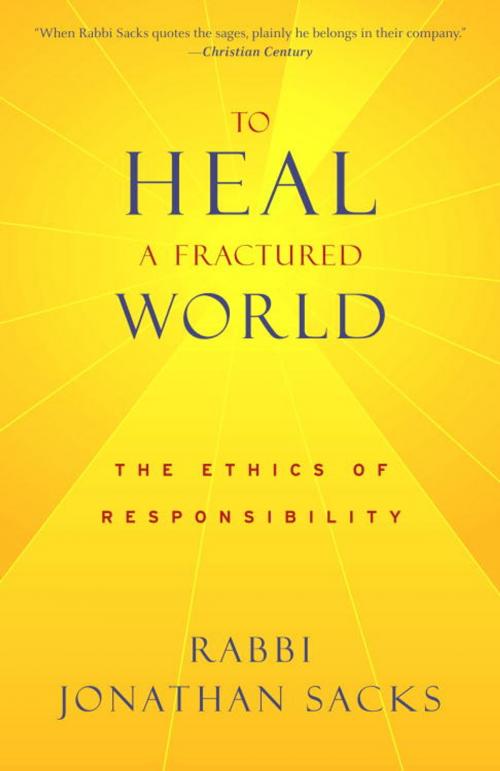To Heal a Fractured World
The Ethics of Responsibility
Nonfiction, Religion & Spirituality, Judaism, Beliefs, Practices, & Rituals| Author: | Jonathan Sacks | ISBN: | 9780375425196 |
| Publisher: | Knopf Doubleday Publishing Group | Publication: | February 6, 2007 |
| Imprint: | Schocken | Language: | English |
| Author: | Jonathan Sacks |
| ISBN: | 9780375425196 |
| Publisher: | Knopf Doubleday Publishing Group |
| Publication: | February 6, 2007 |
| Imprint: | Schocken |
| Language: | English |
One of the most respected religious thinkers of our time makes an impassioned plea for the return of religion to its true purpose—as a partnership with God in the work of ethical and moral living.
What are our duties to others, to society, and to humanity? How do we live a meaningful life in an age of global uncertainty and instability? In To Heal a Fractured World, Rabbi Jonathan Sacks offers answers to these questions by looking at the ethics of responsibility. In his signature plainspoken, accessible style, Rabbi Sacks shares with us traditional interpretations of the Bible, Jewish law, and theology, as well as the works of philosophers and ethicists from other cultures, to examine what constitutes morality and moral behavior. “We are here to make a difference,” he writes, “a day at a time, an act at a time, for as long as it takes to make the world a place of justice and compassion.” He argues that in today’s religious and political climate, it is more important than ever to return to the essential understanding that “it is by our deeds that we express our faith and make it real in the lives of others and the world.”
To Heal a Fractured World—inspirational and instructive, timely and timeless—will resonate with people of all faiths.
One of the most respected religious thinkers of our time makes an impassioned plea for the return of religion to its true purpose—as a partnership with God in the work of ethical and moral living.
What are our duties to others, to society, and to humanity? How do we live a meaningful life in an age of global uncertainty and instability? In To Heal a Fractured World, Rabbi Jonathan Sacks offers answers to these questions by looking at the ethics of responsibility. In his signature plainspoken, accessible style, Rabbi Sacks shares with us traditional interpretations of the Bible, Jewish law, and theology, as well as the works of philosophers and ethicists from other cultures, to examine what constitutes morality and moral behavior. “We are here to make a difference,” he writes, “a day at a time, an act at a time, for as long as it takes to make the world a place of justice and compassion.” He argues that in today’s religious and political climate, it is more important than ever to return to the essential understanding that “it is by our deeds that we express our faith and make it real in the lives of others and the world.”
To Heal a Fractured World—inspirational and instructive, timely and timeless—will resonate with people of all faiths.















